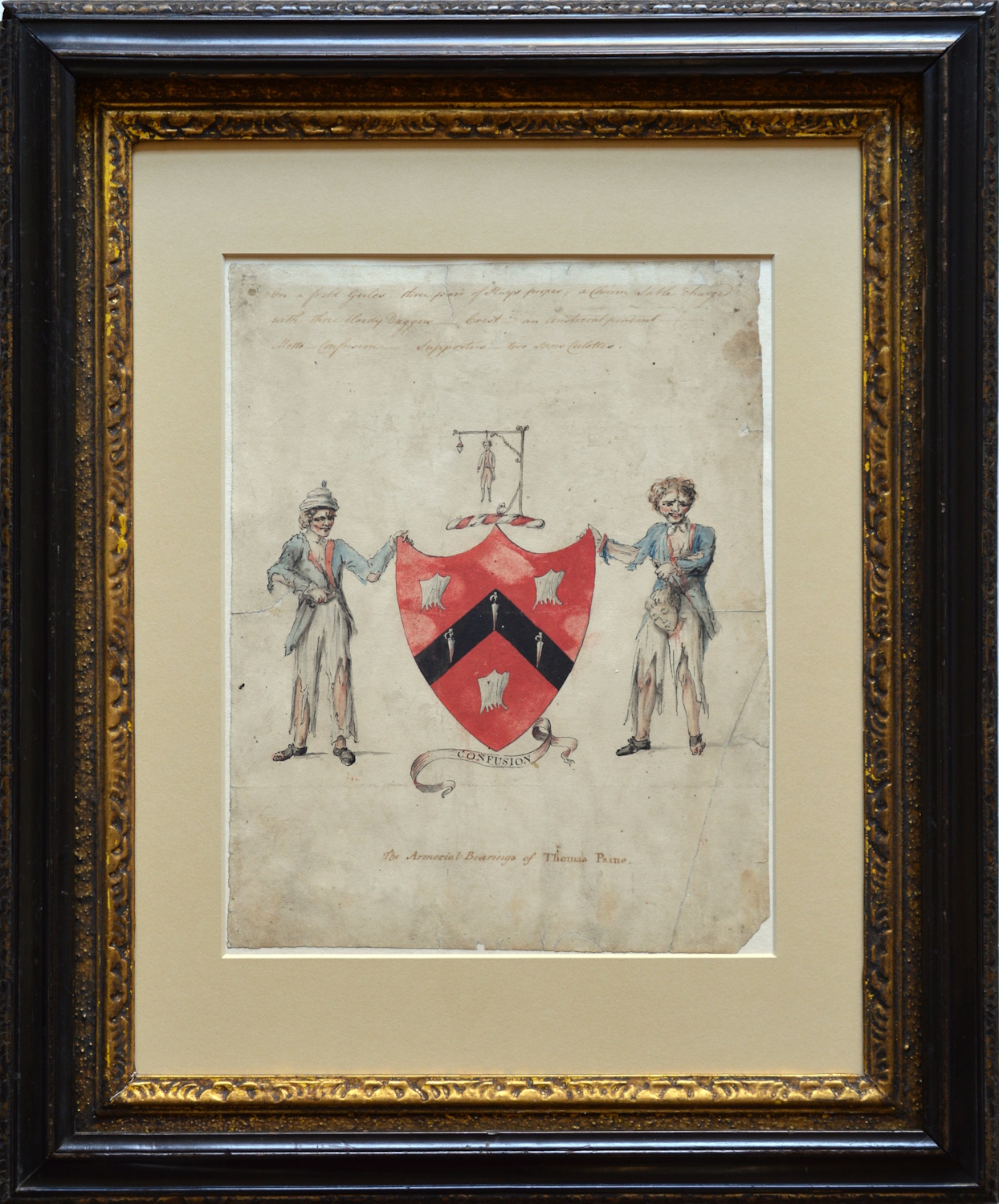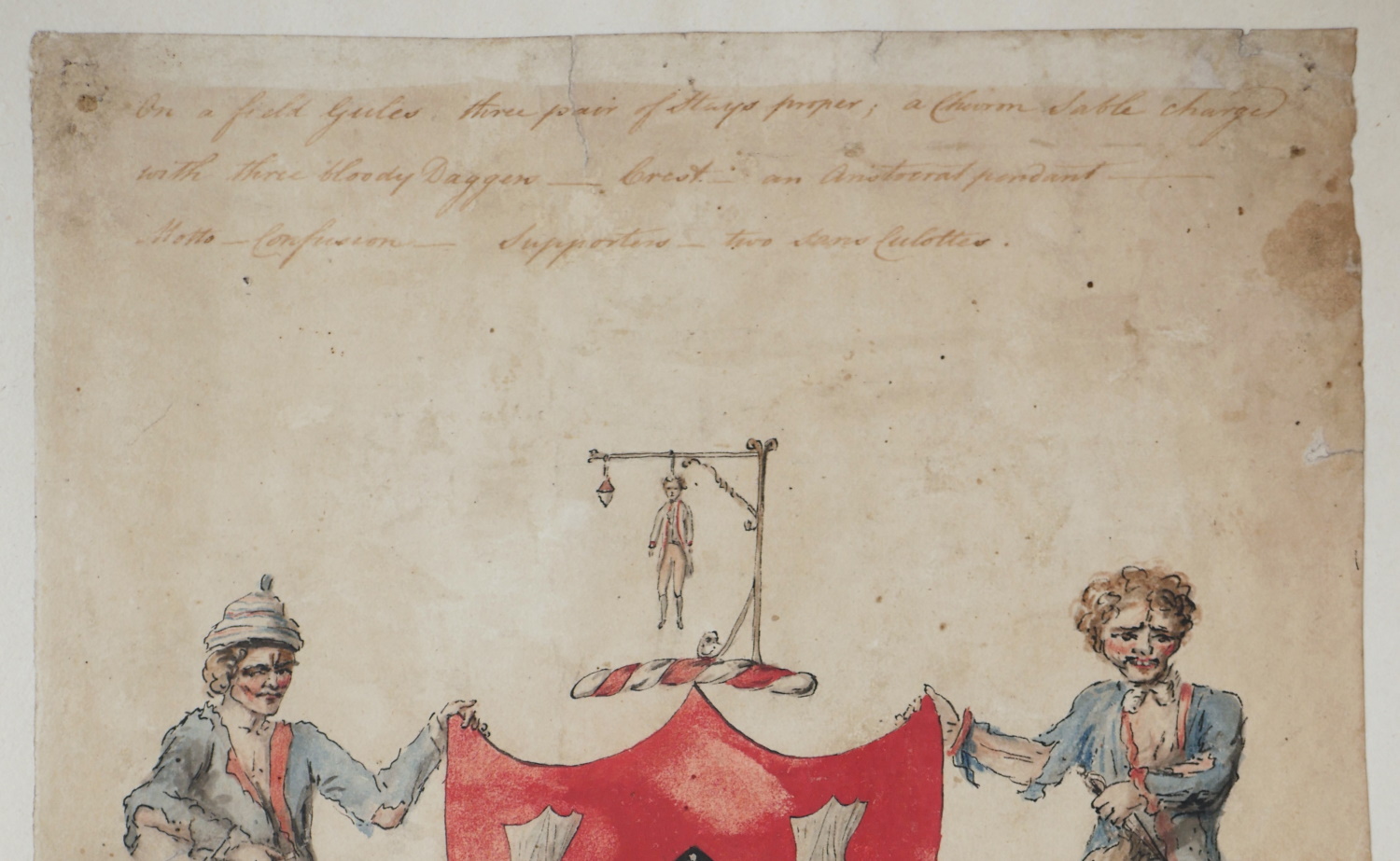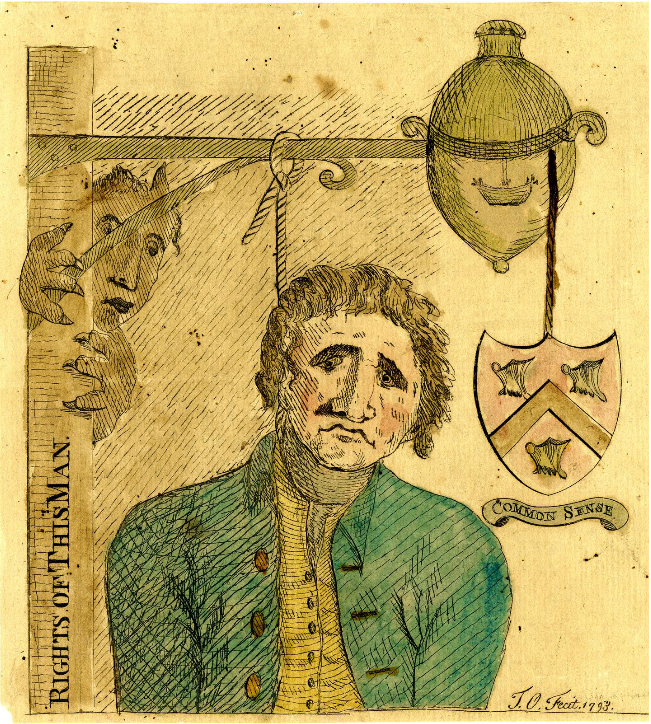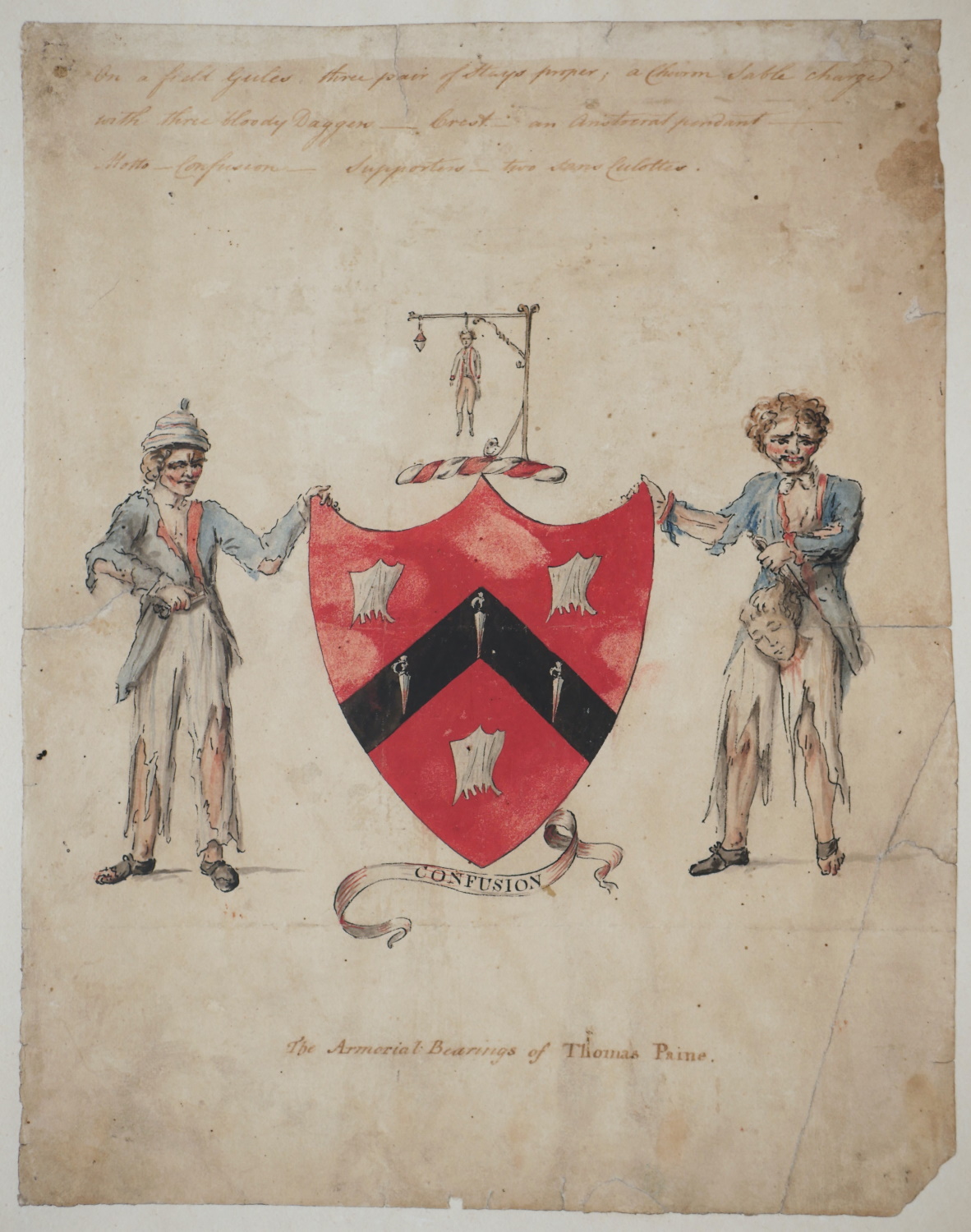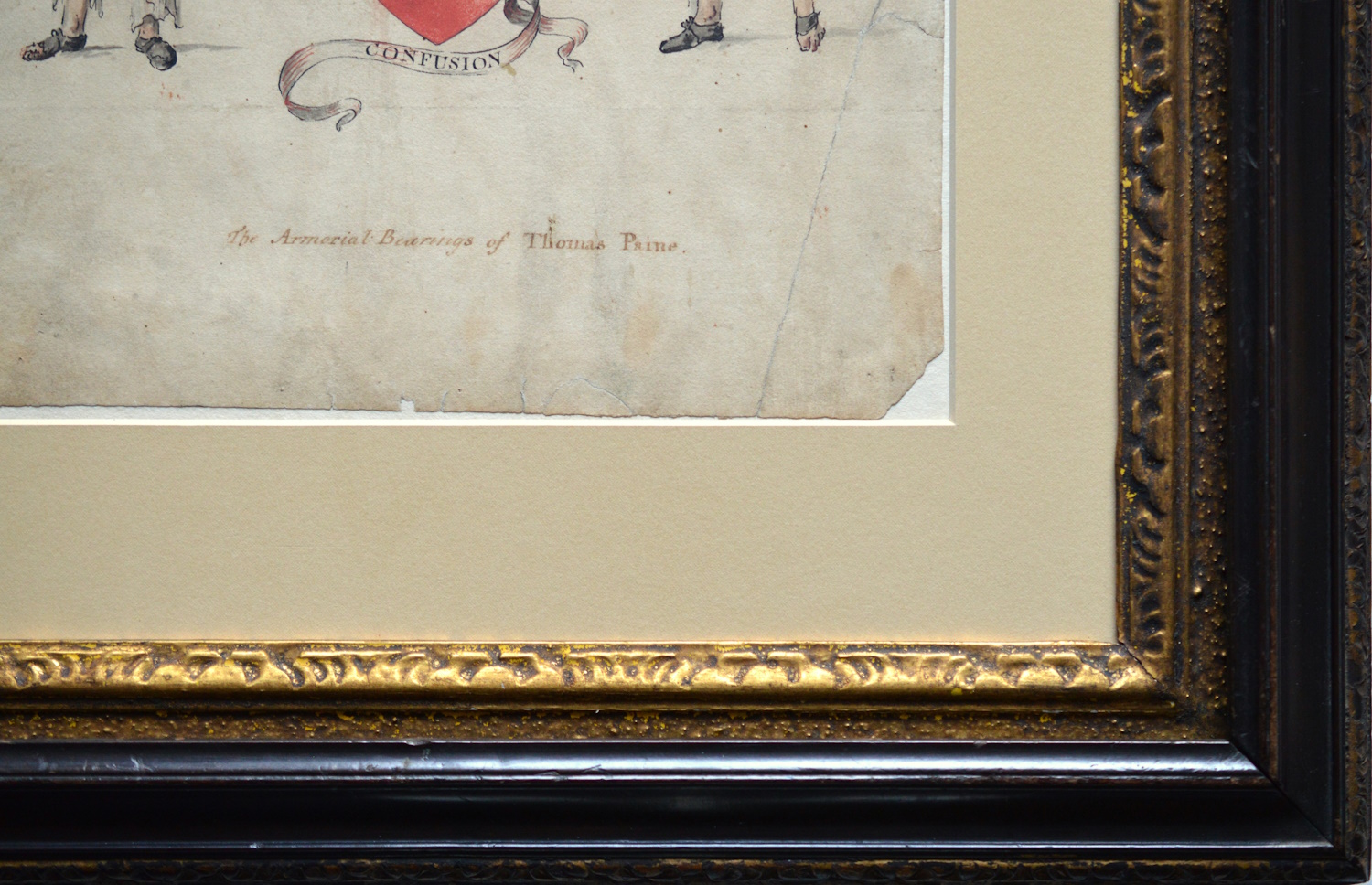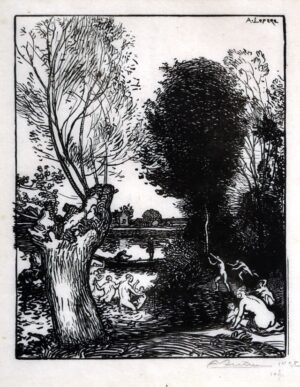Description
Condition: There is a piece of paper missing from the lower right corner and two horizontal tears either side of the two figures. There is also a fold in the lower right and two or three other tears on the outside edges. The entire sheet has been cleaned and consolidated by lining onto archival backing paper. All work has been carried out by an accredited paper conservator.
The crest, an ancestral pendant, shows a man dangling on a noose from a lamp-bracket. There are two men in ragged clothes holding the shield of arms, otherwise known as the Sans Culottes, these lower-class men were radical and militant partisans of the French Revolution. One of the men is holding a dagger with a severed head in his left hand. The shield shows three bloody daggers and three pairs of stays (corsets) set against a red background. In France stays appear to have only been worn by aristocracy. Paine was trained at an early age to follow his father’s trade as a staymaker.
Thomas Paine proposed in his “Rights of Man,” a pamphlet that claimed political revolution was permissible when a government did not safeguard the natural rights of its people. Paine stated:
“They learn it from the governments they live under, and retaliate the punishments they have been accustomed to behold. … It may perhaps be said, that it signifies nothing to a man what is done to him after he is dead; but it means much to the living; it either tortures their feelings or hardens their heart; and in either case, it instructs them how to punish when power falls into their hands.
Thomas Paine (1736/7-1809) was an English-born American political activist, philosopher, political theorist, and revolutionary. He authored Common Sense (1776) and The American Crisis (1776–1783), two of the most influential pamphlets at the start of the American Revolution, and helped inspire the Patriots in 1776 to declare independence from Great Britain. His ideas reflected Enlightenment-era ideals of transnational human rights.
Born in Thetford, Norfolk, Paine emigrated to the British American colonies in 1774 with the help of Benjamin Franklin, arriving just in time to participate in the American Revolution. Virtually every rebel read (or listened to a reading of) his 47-page pamphlet Common Sense , proportionally the all-time best-selling American title, which catalyzed the rebellious demand for independence from Great Britain. The American Crisis was a pro-revolutionary pamphlet series.
Paine lived in France for most of the 1790s, becoming deeply involved in the French Revolution. While in England, he wrote Rights of Man (1791), in part a defense of the French Revolution against its critics. His attacks on Anglo-Irish conservative writer Edmund Burke led to a trial and conviction in absentia in England in 1792 for the crime of seditious libel.
The British government of William Pitt the Younger, worried by the possibility that the French Revolution might spread to Britain, had begun suppressing works that espoused radical philosophies. Paine’s work, which advocated the right of the people to overthrow their government, was duly targeted, with a writ for his arrest issued in early 1792. Paine fled to France in September where, despite not being able to speak French, he was quickly elected to the French National Convention. The Girondins regarded him as an ally; consequently, the Montagnards, especially Maximilien Robespierre, regarded him as an enemy.
In December 1793, he was arrested and taken to Luxembourg Prison in Paris. While in prison, he continued to work on The Age of Reason (1793–1794). James Monroe, a future President of the United States, used his diplomatic connections to get Paine released in November 1794. Paine became notorious because of his pamphlets and attacks on his former allies, who he felt had betrayed him. In The Age of Reason and other writings he advocated Deism, promoted reason and freethought, and argued against institutionalized religions in general and the Christian doctrine in particular. In 1796, he published a bitter open letter to George Washington, whom he denounced as an incompetent general and a hypocrite. He published the pamphlet Agrarian Justice (1797), discussing the origins of property and introduced the concept of a guaranteed minimum income through a one-time inheritance tax on landowners. In 1802, he returned to the US When he died on June 8, 1809, only six people attended his funeral, as he had been ostracized for his ridicule of Christianity and attacks on the nation’s leaders.
